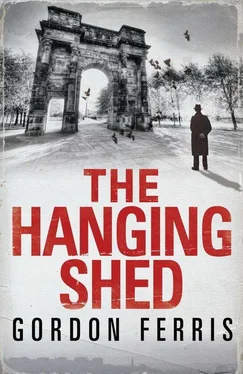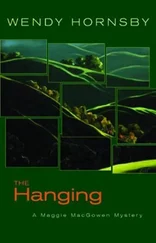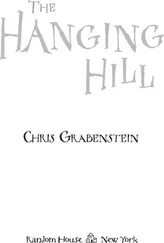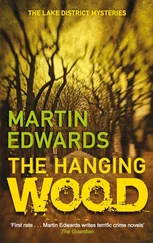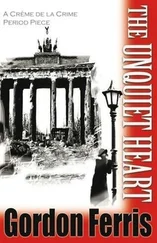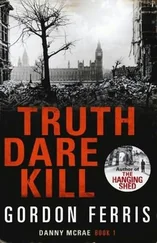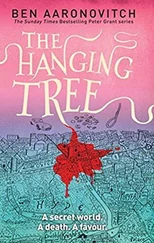Gordon Ferris - The Hanging Shed
Здесь есть возможность читать онлайн «Gordon Ferris - The Hanging Shed» весь текст электронной книги совершенно бесплатно (целиком полную версию без сокращений). В некоторых случаях можно слушать аудио, скачать через торрент в формате fb2 и присутствует краткое содержание. Жанр: Триллер, на английском языке. Описание произведения, (предисловие) а так же отзывы посетителей доступны на портале библиотеки ЛибКат.
- Название:The Hanging Shed
- Автор:
- Жанр:
- Год:неизвестен
- ISBN:нет данных
- Рейтинг книги:5 / 5. Голосов: 1
-
Избранное:Добавить в избранное
- Отзывы:
-
Ваша оценка:
- 100
- 1
- 2
- 3
- 4
- 5
The Hanging Shed: краткое содержание, описание и аннотация
Предлагаем к чтению аннотацию, описание, краткое содержание или предисловие (зависит от того, что написал сам автор книги «The Hanging Shed»). Если вы не нашли необходимую информацию о книге — напишите в комментариях, мы постараемся отыскать её.
The Hanging Shed — читать онлайн бесплатно полную книгу (весь текст) целиком
Ниже представлен текст книги, разбитый по страницам. Система сохранения места последней прочитанной страницы, позволяет с удобством читать онлайн бесплатно книгу «The Hanging Shed», без необходимости каждый раз заново искать на чём Вы остановились. Поставьте закладку, и сможете в любой момент перейти на страницу, на которой закончили чтение.
Интервал:
Закладка:
I hadn’t seen him since I left Kilmarnock for Glasgow University back in ‘29. I heard odd snatches about him from my mother down the years, though she knew I hated every mention. He was a journeyman cooper at Johnnie Walker’s at the same time I was making my way in the Glasgow police force. In ’39 I went into the army, the Seaforth Highlanders, my dad’s old regiment, though I was a lowlander. Donovan ended up in the RAF, Bomber Command. A tail gunner. A guaranteed way of getting yourself killed for real. Which is exactly what happened.
In a letter from my mother in 1943 I was told that Hugh Donovan had died in his bomber in the flames of Dresden. My first ungracious thought was: Serves you right, you sod. Then remorse made my cheeks burn. It prompted me to write to his mother saying how sorry I was to hear the news. But the guilt of that instant wasn’t so easily erased.
‘Shug? Is it you?’
‘Aye, Dougie, it is.’
‘But how, what the hell? I thought you were dead!’ My voice cracked and echoed round the empty entry.
‘So did I, old pal. So did I.’
‘But this is great! Just fantastic!’ I could stop feeling bad about him, about how we’d left things. Time to move on.
He cut in. ‘Dougie. It’s no… It’s no great at all…’
TWO
T he train roared through a station, lights flickering briefly before we plunged back into the dark. The sour scent of cheap Scotch tinged the air. The bloke in the bunk below had sucked patiently on a half-bottle to get to sleep. Mother’s milk where he came from; we came from, I reminded myself. I’d resolutely declined when he’d passed the bottle up to me. To prove I could. Now I wish I’d taken a slug or two. My brain was fidgeting. I lay in the dark and lit another fag and thought about going home, and what I meant by that.
There was Kilmarnock, the place where I was born and grew up. And there was Glasgow, where I’d gone to university, studied languages and in a fit of rebellion, joined the police. A town and a city a mere twenty miles apart, but they might as well have been on different continents. It wasn’t just that I left my boyhood behind on the short train journey from Kilmarnock. It was as though someone had carelessly spliced two strips of films together from entirely different movies. The lead character had changed, as had the supporting cast and the entire plot and arc of the film. The one connecting thread between the two places was the language of the script and the sharp-edged humour and brashness of the West Central Lowlands. Where no German spy could mimic the tortured accents. His request for a pie and a pint in any of the hard pubs that littered the slummy landscape would have earned him a good kicking before being handed over to the comparative safety of the polis.
I’d last been in Kilmarnock in late ’43, on leave from my regiment, proud to bursting of the 2nd lieutenant’s pips on my epaulettes and the North Africa ribbon on my chest. The dull khaki of my battledress tunic was outshone by the strong blues and greens of the MacKenzie tartan in my Seaforth kilt. I rolled off the train with my kit bag over my shoulder and my Tam o’ Shanter pitched at a suitably jaunty angle on my head. I was the picture of health. My leg had healed. Army training and the residue of the desert sun had honed me into a lean brown warrior. I bounded down the steps of the station and out into Kilmarnock’s high street. The heavy swing of the kilt made me lift up my head and push out my chest as if I was on parade. I marched down King Street with its stout Victorian facade, and strolled nonchalantly one full time round the cross – the town centre, with its statue of James Shaw in the middle of it.
I caught the smiles on girls’ faces: See you at the Palais on Saturday, then? And the nods of welcome from the old men: You’ve done your time now, laddie, just like us in the last one. When I thought I’d earned enough silent plaudits, I sauntered back up the Foregate and up the Gas Brae. I was held up briefly at Barclay’s yard as they trundled a new locomotive across the main street and on into the run of rail tracks that would channel it into service. The driver nodded and winked at me and I was eight again and enthralled by the giant metal wheels and the massive boiler.
I was marching into my own past, shedding the years with every step, casting off the veneer of learning, city airs and cynicism, and three years of hard fighting. On up to Bonnyton. On the left, climbing up the hill, smart rows of smoke-black sandstone terraces. Opposite, on the right, a clutch of older, sorrier tenements where the mining community clustered and from where, each day, the buses picked up the lines of men and ferried them off to dig the black seams below the fertile Ayrshire hills. I turned right and marched through the rows of grey tenements and across the drying greens. Washing flapped on the lines strung between the communal poles. The smell of washed linen anywhere in the world would take me back to that spot in a heartbeat.
She was there behind the net curtains looking for me. I saw the twitch. Sure enough she was out in a moment, her tiny frame all mobile and flapping, and her white hair shining and lifting in the warm breeze. A lifetime ago it had been red as rowan berries. For a while it seemed I’d inherited her wild colour. But as I grew my father’s black bristles counter attacked and turned mine to a compromise shade of dried blood. Only my morning stubble held the memory of her oriflamme. And his dark eyes, his height and miner’s shoulders won out against her grey eyes and elfin figure.
‘Hello, Mum,’ I called and waved. I dropped my bag and held out my arms.
She scooted towards me, not sure where to put her hands, on her face, outstretched in front of her, or clasped in some inner prayer. The hero’s return.
‘Oh Douglas, Douglas. Look at you! Ma wee boy!’
The tears were already coursing on her cheeks. And my eyes were wet by the time she clasped me to her. She felt like a bird, so light and bony. She smelt as she always did, a mix of coal-tar soap that she scrubbed her face with, and lavender from the sachets she hung on her handful of clothes. The very essence of home. I breathed it in, and was a child again. Some of the neighbour women poked their heads out, just by accident of course. But they were all beaming, glad to see one of their sons returned in one piece. Though most of their men-folk had been in reserved service down the pits, there were enough that hadn’t come back or had come back maimed.
The one black mark on the day, on all my days now, was the absence of the big man with the coal dust stamped in his hands and on his forehead in a line below his helmet. My father. Three years after his death her red had turned to snow as though she had no further need of it. My mother and I would visit his grave in the afternoon with flowers. Me in my uniform still, to show him what I’d become. What he’d made me. But unable now to delight in the banter over our shared uniform. No chance now of him saluting me with an insolent grin to show that a sergeant could honour a son even though he was now a bloody officer.
This homecoming would be different. I’d lost that bounce and sense of invulnerability that had swept me home two and a half long years ago. My skin had a London pallor and my shock of mud-red hair bore stubs of grey on my sideburns. Only thirty four, one year short of the biblical half way mark, and already on the downward slope.
This summons was too soon. It felt like I was rushing pell-mell towards a nexus in my life of dark threads spewing from my past. I wouldn’t have been surprised if the conductor had appeared with red-hot coals for eyes and an announcement that the next stop was purgatory.
Hugh Donovan had survived the war and was calling from a pay phone in the visitor section of Barlinnie Prison, Glasgow. The Bar-L, the Big Mansion House, as we used to call it. Thanks to my own problems I’d missed all the furore north of the border. Certainly missed the trial and the verdict. Hugh wanted to see me, to convince me of his innocence. But why me? Why call the man he shafted, the man who still nursed rancour for what he’d taken from me? Why the hell would he think I’d care whether he was guilty or not? Just when I was getting my life back in some sort of order, he kicks up the pieces and I lose the pattern again. And by the sound of it, and from the inquiries I made later that day, he was guilty as sin. It had taken just four months from his arrest in November 1945 to conviction and sentencing.
Читать дальшеИнтервал:
Закладка:
Похожие книги на «The Hanging Shed»
Представляем Вашему вниманию похожие книги на «The Hanging Shed» списком для выбора. Мы отобрали схожую по названию и смыслу литературу в надежде предоставить читателям больше вариантов отыскать новые, интересные, ещё непрочитанные произведения.
Обсуждение, отзывы о книге «The Hanging Shed» и просто собственные мнения читателей. Оставьте ваши комментарии, напишите, что Вы думаете о произведении, его смысле или главных героях. Укажите что конкретно понравилось, а что нет, и почему Вы так считаете.
